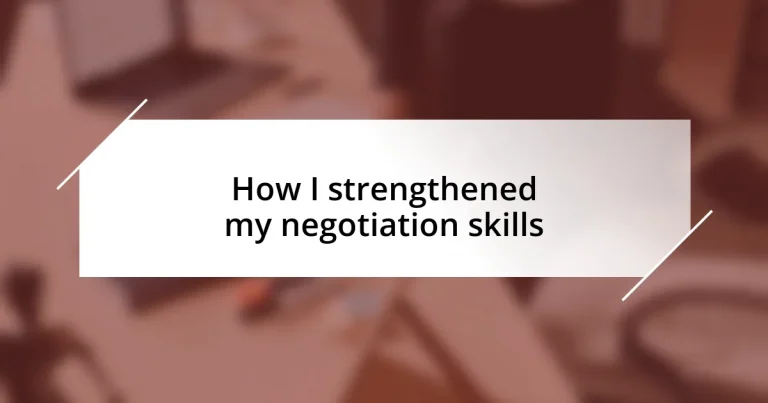Key takeaways:
- Effective negotiation is about finding common ground, emphasizing active listening and empathy for successful outcomes.
- Identifying personal challenges, such as fear of rejection and emotional reactions, is crucial in overcoming barriers to negotiation confidence.
- Utilizing techniques like win-win negotiation, softening statements, and role-playing is essential to enhance negotiation skills and foster collaboration.
- Continuous improvement through feedback, education, and self-reflection significantly contributes to developing effective negotiation strategies over time.
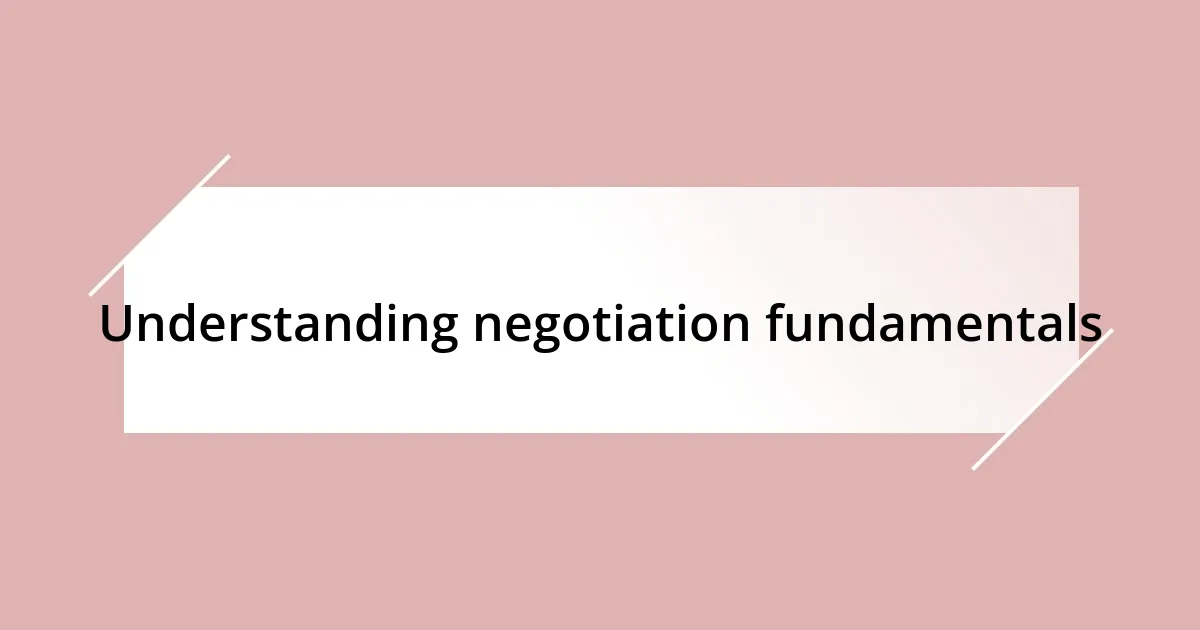
Understanding negotiation fundamentals
Understanding the fundamentals of negotiation is like cracking the code to successful interactions. For me, it started with recognizing that negotiation isn’t just about winning or losing; it’s about finding common ground. Have you ever felt that rush when you realize both parties can walk away happy? That moment is what effective negotiation is all about.
One of the most pivotal lessons I learned was the significance of active listening. I remember a time when I was so focused on articulating my points that I completely missed my counterpart expressing a serious concern. When I finally tuned in, it changed the entire dynamic. Listening isn’t passive; it’s an active tool in negotiation that signals respect and opens the door to creative solutions.
Lastly, I’ve come to understand that preparing isn’t just about knowing your desired outcome—it’s about anticipating the other side’s needs and interests too. There was an instance where I walked into a negotiation thinking I had the upper hand, only to discover my counterpart had needs I hadn’t even considered. That realization taught me that understanding what the other party wants can be just as important as knowing what I want. What if we shifted our focus to empathy in these negotiations? It can truly transform the experience.
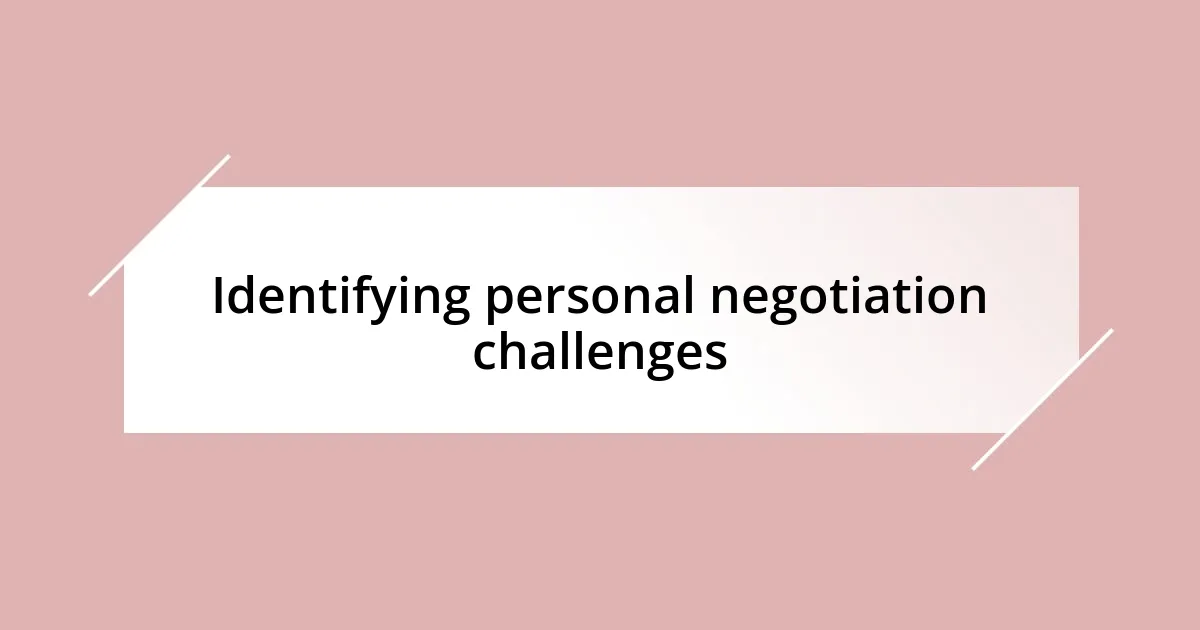
Identifying personal negotiation challenges
Recognizing my personal negotiation challenges has been a journey of self-discovery. Early on, I would cringe at the thought of confrontation, fearing that my voice would drown out by the more assertive negotiators. Reflecting on that fear, I realized it stemmed from a lack of confidence in presenting my ideas. It’s critical to identify what holds us back so we can develop strategies to overcome those barriers.
Here are a few common personal negotiation challenges I’ve observed in myself and others:
- Fear of rejection: I used to hesitate when making offers, worrying about how the other person might react.
- Over-preparation: Sometimes, I’ve been too focused on my script, missing out on the fluidity of conversation.
- Underestimating my worth: In past negotiations, I often undervalued my contributions, which hurt my position.
- Emotional reactions: I found that when discussions got heated, I’d often lose my cool instead of maintaining composure.
- Lack of practice: Not engaging regularly in negotiations left me feeling rusty when it truly mattered.
Recognizing these challenges is the first step toward growth. By confronting and addressing them, I’ve become more equipped to handle negotiations effectively and confidently.
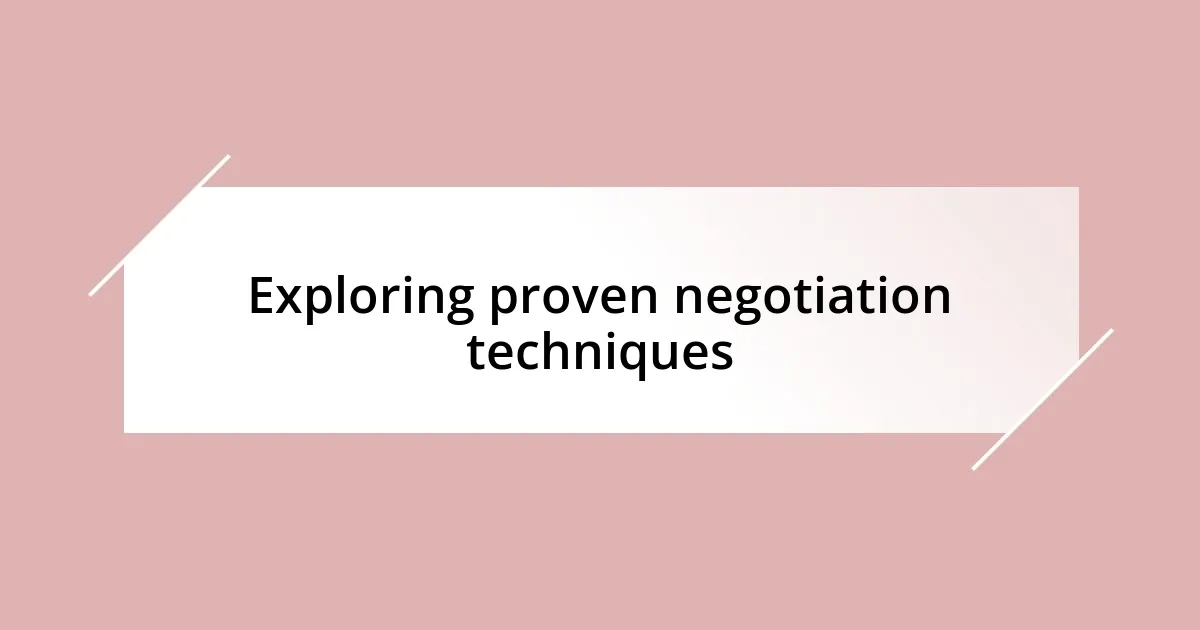
Exploring proven negotiation techniques
Negotiation techniques can truly transform how we approach discussions. One approach I found particularly effective is the principle of win-win negotiation, where both parties aim to achieve mutually beneficial outcomes. I remember a specific negotiation regarding a project timeline that seemed insurmountable. By focusing on each other’s priorities, we both left the table feeling satisfied, and that wasn’t just a lucky break; it was a testament to the power of collaborative negotiation strategies.
Another technique that I often revisit is the use of “softening statements.” These are phrases that can ease tension and foster open dialogue. In a recent salary negotiation, instead of diving straight into numbers, I said, “I’d love to find a way to make this work for both of us.” The reaction was surprisingly positive, and it illuminated how I could steer conversations toward constructive outcomes. It’s a simple shift, but it carries the weight of respect and sincerity.
Role-playing scenarios before actual negotiations has also proven invaluable for me. Practicing possible outcomes and responses allows me to navigate the conversation more smoothly. In preparation for a high-stakes meeting, my friend and I took time to role-play both sides, which helped me anticipate objections and refine my responses. It was nerve-wracking, but the confidence boost I gained made all the difference when it was time to put those techniques into action.
| Technique | Description |
|---|---|
| Win-Win Negotiation | Aiming for mutually beneficial outcomes where both parties leave satisfied. |
| Softening Statements | Phrases that help ease tension and encourage open dialogue. |
| Role-Playing | Practicing negotiations to prepare for real-life conversations. |
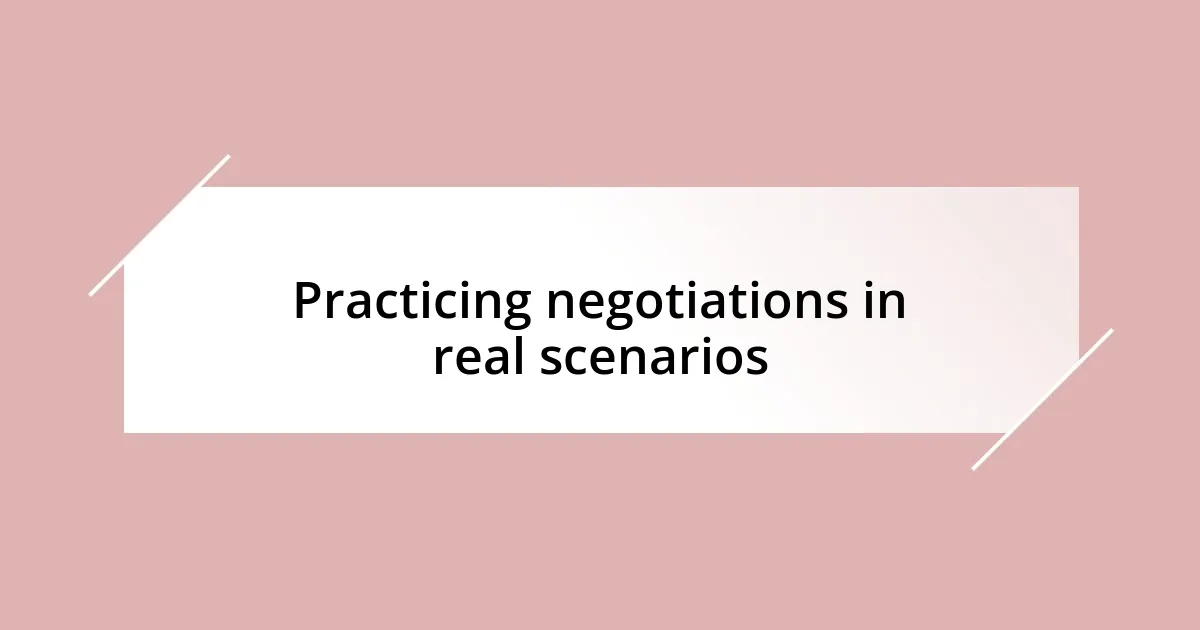
Practicing negotiations in real scenarios
Practicing negotiations in real scenarios has been a pivotal part of my journey towards confidence. I recall one particularly tense meeting with a vendor where I knew I had to advocate for a lower price. Instead of retreating into avoidance, I practiced staying present and grounded. As we discussed options, I felt the shift in my energy, realizing that I had as much to offer as they did. Have you ever felt that moment when your voice gains strength? It’s incredible how engaging in actual negotiations can transform your mindset.
I’ve also learned the importance of picking smaller, everyday situations to practice my negotiation skills. For instance, I often negotiate with my friends when deciding on dinner plans. It started as casual banter but evolved into a safe space where I could test my techniques—like articulating my desires while being attentive to theirs. This practice has taught me that negotiation is not always about high-stakes situations; it’s about understanding and collaboration, even in the simplest of choices.
During a recent job offer negotiation, I felt the anxiety creeping in. To combat that, I made a conscious choice to view it as a mutual dialogue rather than a battleground. I remembered a friend’s advice to stay curious. Asking questions like, “What can we do to find common ground?” transformed my approach. Instead of pushing for my needs, I engaged in a conversation that fostered trust. It was a game-changer for me. How often do we hesitate to ask questions, thinking we should have all the answers? Embracing curiosity can be the key to unlocking fruitful negotiations.
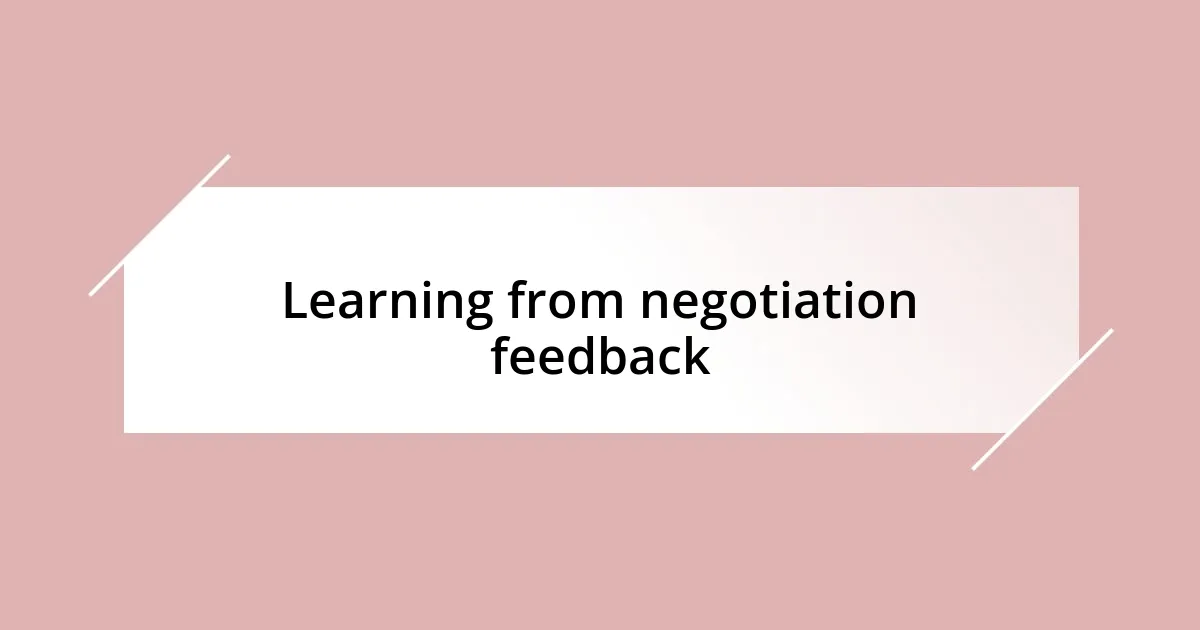
Learning from negotiation feedback
Feedback is one of the most valuable tools in honing negotiation skills. When I first started soliciting feedback after my negotiations, I was amazed at how a quick debrief could highlight my blind spots. For instance, after a particularly challenging negotiation with a supplier, I asked a colleague for their perspective. They pointed out moments where my body language may have conveyed uncertainty. That honest feedback made me realize how critical non-verbal communication is in establishing authority and confidence.
Reflecting on the feedback I’ve received often leads to deeper insights. After a salary negotiation that didn’t go as planned, I took time to analyze what was shared with me. One comment stood out: “You seemed hesitant when discussing your worth.” That struck a chord. Now, I always remind myself that if I don’t advocate for my value, no one else will. I’ve learned to prepare and practice articulating my contributions clearly, allowing me to enter negotiations with a strong foundation. Have you ever felt uneasy about stating your worth? It can be transformative to learn how to express it confidently.
Engaging in a feedback loop also cultivates stronger relationships. Recently, during a team meeting, I presented my negotiation strategy and asked for input on how I could improve. That openness not only provided valuable insights but also encouraged my teammates to feel invested in my development. It’s a reminder that feedback isn’t just about critique; it’s about collaboration and growth. How often do we overlook the power of shared insights? Embracing feedback as a collaborative tool can be a game-changer in our negotiation journeys.
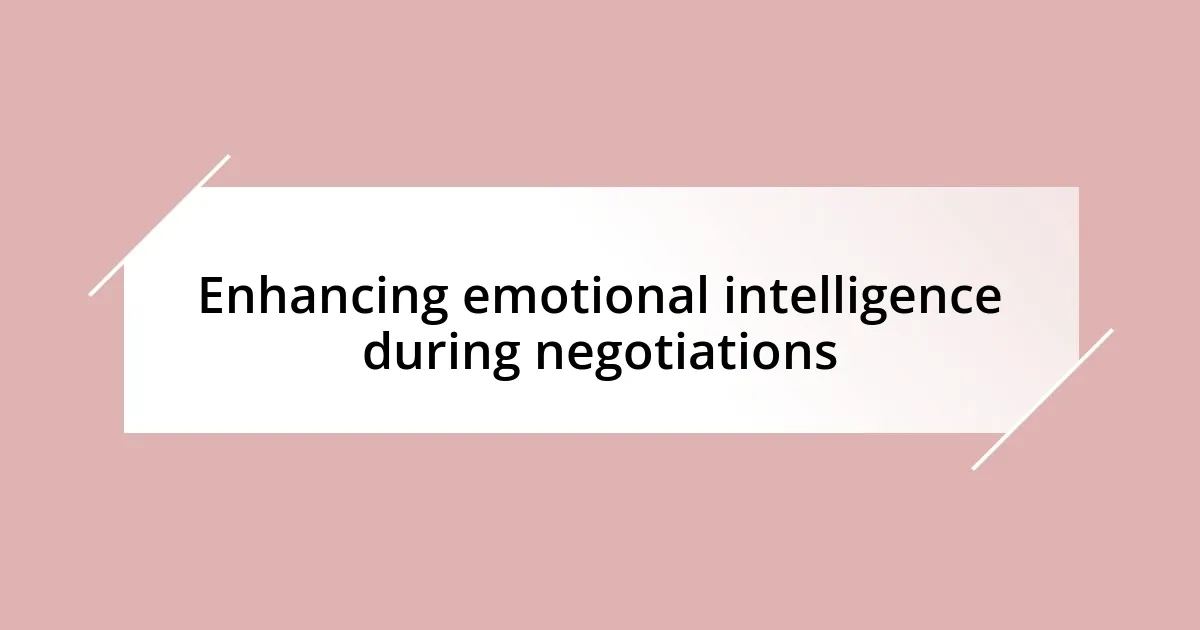
Enhancing emotional intelligence during negotiations
Enhancing my emotional intelligence during negotiations has been a revelation. I remember a time when I was negotiating a project deadline with a client who was clearly stressed. Instead of merely sticking to my agenda, I paused and acknowledged their anxiety. “I can see this is important to you,” I said. That small act of empathy shifted the tone of the conversation, allowing us to explore a solution that worked for both of us. Isn’t it fascinating how simply recognizing someone’s feelings can diffuse tension and open doors?
I often reflect on how emotions play a vital role in negotiations. Once, while discussing budget constraints, I sensed the frustration of my colleague rising. Instead of pushing my points, I chose to validate their feelings by saying, “I understand this can be overwhelming.” This acknowledgment created a space for them to express their concerns, leading us to a more collaborative dialogue. It’s incredible to think about how emotional intelligence can transform adversarial conversations into partnerships. Have you ever realized that a simple acknowledgment can change the course of a negotiation?
Moreover, actively managing my emotions has become essential to my approach. During a recent contract negotiation, I felt my heart racing as the stakes felt high. I reminded myself to breathe and ground my emotions. I focused on my goals while remaining aware of the emotional climate in the room. This awareness helped me navigate the conversation with flexibility, adapting my tactics based on the other party’s reactions. How often do we let our emotions control us in critical moments, rather than using them as tools? Being emotionally aware not only helps in staying calm but also in recognizing the emotions of others, making for a more successful negotiation.
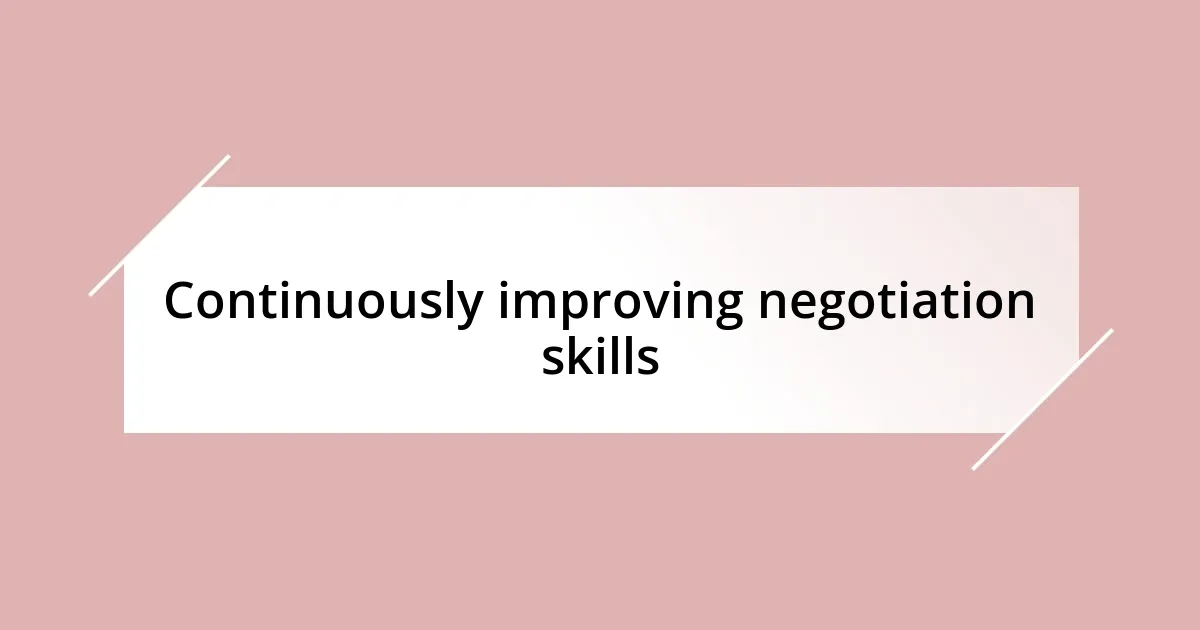
Continuously improving negotiation skills
Improving negotiation skills isn’t something that happens overnight; it’s an ongoing journey. I remember when I joined a negotiation workshop that emphasized role-playing exercises. Initially, I felt awkward pretending to argue my point with peers, but the experience was eye-opening. Each session revealed new tactics, and I began to adopt techniques like mirroring body language to build rapport. Have you ever tried stepping into someone else’s shoes during a negotiation? It can surprisingly change the dynamics and outcomes.
Another critical aspect of my growth has been actively pursuing ongoing education. I’ve delved into books and online courses about negotiation strategies, often discovering new perspectives that challenge my existing beliefs. For instance, I learned about the concept of “anchoring,” where the initial offer can shape the negotiations that follow. When I applied this during a recent deal, framing my opening offer became a strategic move that significantly swayed the conversation in my favor. Isn’t it empowering to expand your knowledge and see it translate into real-world success?
Lastly, I frequently practice self-reflection, analyzing my successes and setbacks after each negotiation. Recently, I took the time to jot down what strategies worked and which didn’t. I realized I had been overly focused on outcomes rather than the process. Reflecting on this shift allowed me to emphasize collaboration over competition in future negotiations. How often do we overlook the learning opportunities in our experiences? Embracing this reflective practice not only fosters improvement but also encourages a mindset that welcomes growth in every negotiation scenario.












